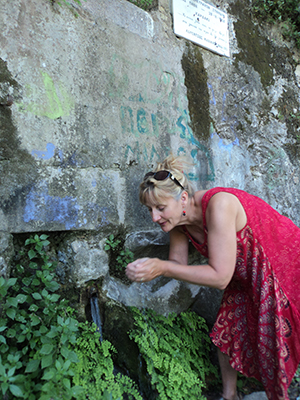 There is a scene in the film Shirley Valentine in which the leading lady rounds on her fellow hotel guests who are trotting out all the old stereotypes as they complain about the Greeks.
There is a scene in the film Shirley Valentine in which the leading lady rounds on her fellow hotel guests who are trotting out all the old stereotypes as they complain about the Greeks.
For the life of me I can’t find the relevant YouTube link to remind myself but the gist of it came to me when I read Humphrey Walwyn’s piece about the Greek crisis in last month’s issue.
I can hear Pauline Collins’ voice now: “It’s a good job we’re not having soup, or else I’d put me head in it and drown meself.”
Having recently spent twelve months in a tucked-away Corfiot village very much like my own in west Dorset, I’d like to offer a different perspective.
We’ve just driven from Broawindsor to Greece, Land Rover packed sky high and a panting dog called Artemis in the back. The village, Doukades, where my husband and I lived from October 2012 to October 2013 and where the scandalous, romantic adventurer, Dorset’s Jane Digby, lived in the 1800s, has not changed very much.
Doukades sits beneath sheer, red cliffs overlooking a valley of olive groves towards the mountains. It nestles into the stark outcrop of rock like a pigeon between the branches of a lemon tree. When the wind blows, it is anchored, firm and safe.
Earlier this year, the water board sub-office in the village closed and was absorbed into the main office in Corfu Town. The village’s three tavernas have been much quieter than usual for the season. But life goes on. In the evenings, children still tear around the central plateia on their bikes while their parents sit around tables outside the kafenion and village hall, catching up on the latest news. A stray dog wanders up the road as a man goes up a high ladder to hammer out a tune on the church bells.
In the town, there are no queues at the ATM machines and the market is full of produce. The island is operating as normal. It’s very much open for business. So yes, come over and buy some tatty trinkets or have moussaka and chips to support the Greek economy. But if you’re more discerning, go for slow roasted pork with garlic, which is not even on the menu, and seek out a maker of mosaics.
Think yourself lucky that you’re not a Greek who can take out only 60 euros a day from the bank, even if you’ve got thousands in your account. Or, as in the case of a man we know from the village, is sacked when the new owner of the hotel where he’s worked for twenty five years, overhears his personal views on the crisis. They had a difference of opinion and the employee had to go. Luckily, he’s found another job, but miles away on a small island to the north of Corfu. It’s almost like political exile…
In front rooms and in coffee bars, on sun loungers and all through the internet and the media, there is confusion and differences of opinion.
“It is very quiet,” says a waiter in one of the three tavernas. He does not have a good word to say about Alexis Tsipras.
“It will be drachma in three months, three months.”
His neighbour disagrees, criticising the country’s last two prime ministers and comparing German finance minister Wolfgang Schäuble to a certain WWII dictator.
“They want to control the rest of Europe, they want to control the Greeks.”
There is bewilderment from many who said ‘no’ in a referendum but are now being taken down the very path they didn’t want to go on.
If I hear anyone nod sagely that the Greeks are at fault ‘because they are lazy’ I will personally insert an Olympic-sized discus up their rear end.
A chart produced by Statista and published in The Independent shows that the Greeks work the longest hours in Europe; an average of 42 hours a week compared with Portugal at 39.3, Spain 38, UK 36.5 and Germany 35.3.
Over the years, corrupt politicians and irresponsible lenders have connived to make a complete pig’s ear of the Greek economy. There are so many aspects to this crisis, with the rich getting away with it while ordinary people are suffering.
Times are hard here, even on the islands, there’s no doubt about it. Harder of course on the mainland, with unemployment at 25 per cent (it’s been like that for several years). But it’s more than an economic crisis, it’s a humanitarian one.
According to a report by Sky News, Greece’s largest children’s charity, Smile of the Child, is running out of money because people and companies have stopped donating. Some of Greece’s children are abandoned because their parents can’t afford to raise them. These children are paying the price for a problem that began before they were born.
The Greeks are the kindest, most genuine people I have ever met. That generosity of spirit, that filoxenia; well, there are people elsewhere in Europe who could do with some of that.




